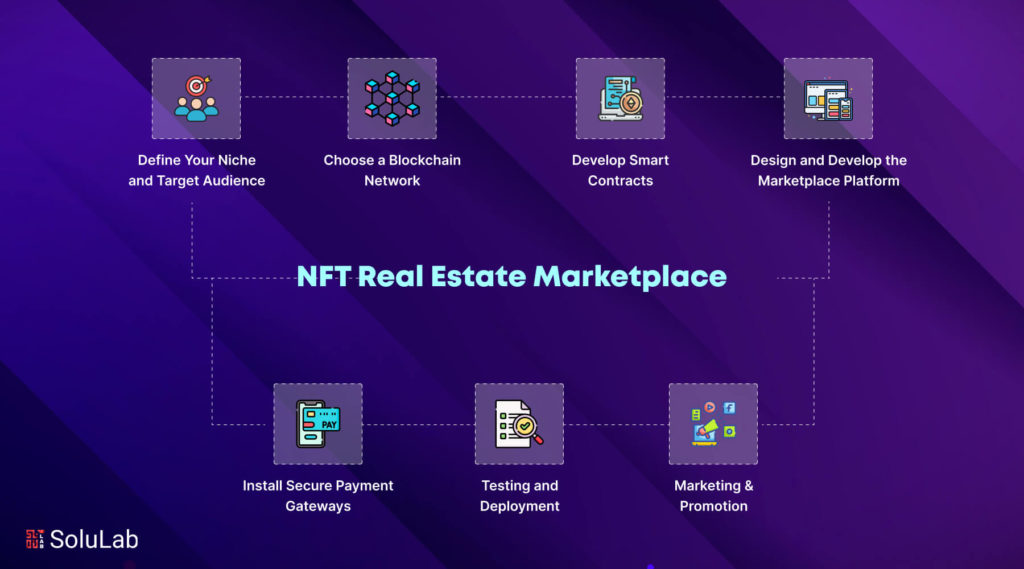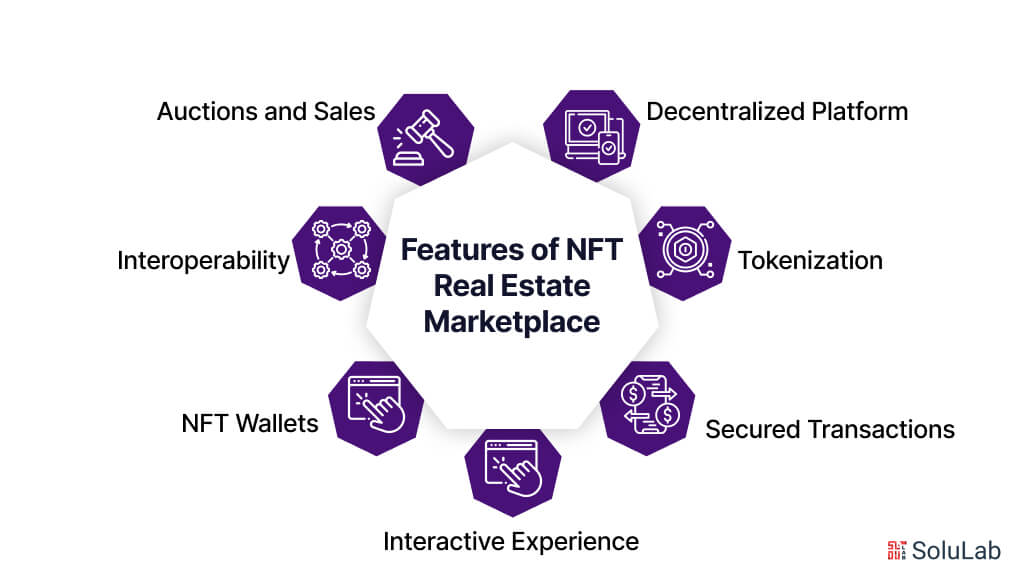
The technical space has undergone a full upheaval because of technological breakthroughs. In the industry, NFT is a popular issue along with developing technologies like Blockchain, Crypto, and AR/VR. Following the emergence of non-fungible tokens, NFT Marketplaces have proliferated. These markets are used by users from all over the world to buy, sell, trade, and manage assets such as real estate. The work of real estate investors might be made easier by an NFT real estate marketplace. It gives investors the option to purchase and sell real estate using a safe and secure digital infrastructure.
Experts estimate that about 25% of all NFT transactions were for virtual properties. These lands are thought to be worth $300 million in total. Other significant advancements in real estate NFT sales include the augmented reality mirror world real estate game Superworld. At $500,000., Mars House was the first virtual residence to be offered for sale on an NFT real estate platform. By giving each user a unique identity, an NFT real estate marketplace offers a strong and secure architecture that guards against data manipulation and security risks. Businesses, entrepreneurs, and celebrities have a profitable opportunity to invest in the NFT sector.
In this blog, we will learn what NFT is all about, its benefits, and features, and a step-by-step process of developing NFT Real Estate Marketplace.
What are NFTs?
Non-fungible tokens, or NFTs for short, are digital blockchain-based tokens that are distinguished from other tokens by a unique identifier and set of information. Every NFT is distinct and has a single owner. On NFT marketplaces, they may be exchanged for fiat money or cryptocurrency, though.
Given that it resembles blockchain tokens, one may wonder, “How are NFTs different from blockchain tokens?” We need to know that there are two categories of blockchain tokens: fungible tokens and non-fungible tokens, in order to distinguish between them. The distinction lies in the fact that fungible tokens allow for the creation of as many copies as the blockchain permits. Non-fungible tokens, on the other hand, are distinct and unreplicable. They can identify anything thanks to their unique ID.
The main distinction is that non-fungible tokens, or NFTs, are unique and may only be owned by one individual, whereas fungible tokens are duplicated and not unique.
With the help of blockchain technology, NFTs operate more quickly, consistently, securely, and efficiently. NFTs have the potential to
- Discover who owns a piece of real or digital property.
- Exchange or trade NFTs with ease.
- Maintain strict and transparent blockchain asset sales records.
What is NFT in Real Estate?
NFTs, or Non-Fungible Tokens, have revolutionized various industries, and real estate is no exception. In real estate, NFTs represent ownership or stakes in properties through a digital token on a blockchain. Unlike traditional real estate transactions that require extensive paperwork and intermediaries, NFTs streamline the process by providing a secure, transparent, and immutable record of ownership. This innovation not only simplifies property transactions but also opens up new opportunities for fractional ownership, allowing multiple investors to own a percentage of a property. By leveraging the blockchain, real estate NFTs ensure that all transactions are transparent and tamper-proof, enhancing trust among stakeholders.
When exploring what is the NFT marketplace, it becomes clear that these digital platforms are pivotal in facilitating real estate transactions. The NFT marketplace for real estate is rapidly evolving, providing a platform where digital real estate assets can be bought, sold, and traded. These marketplaces operate similarly to traditional real estate markets but with added efficiency and accessibility. Through these platforms, investors can browse listings, verify property details, and complete transactions seamlessly. The introduction of NFTs in real estate also enables the tokenization of various property types, from residential homes to commercial buildings, and even virtual land in metaverses. As the NFT marketplace continues to grow, it is set to redefine real estate investment, making it more inclusive and accessible to a global audience.
How Do NFTs Work in the Real Estate Industry?
NFTs are used to stand for property in real estate. Any user can buy homes using cryptocurrency or fiat dollars. When the owner gets payments in tokens via the marketplace, the buyer obtains a property NFT representing a specific virtual or physical item. This property NFT represents evidence of ownership of a real estate asset.
NFTs in real estate include a large amount of data, and keeping it on the blockchain might be costly. To address this issue, smart contracts provide a connection to the asset properties represented by NFTs that only the owner has access to. The data smart contracts store comprises of
- Details on the ownership
- Location of real estate
- Rights of investors
- Parties that are eligible for royalties on each sale of NFT
- Ownership history
What are the Features of NFT Real Estate Marketplace?

In order to create an NFT Real Estate Marketplace that is as dynamic as possible, it is crucial to incorporate the necessary elements. Understanding the real estate NFT features is also crucial.
The following are features of an NFT Marketplace that are not to be overlooked.
- Decentralized Platform: The blockchain technology that powers the real estate NFT marketplace offers a decentralized platform. This indicates that no one body regulates it and that each user actually owns their own assets.
- Secured Transactions: Transparency and security are offered by transactions conducted on decentralized platforms. The blockchain records every transaction, shielding it from various cybersecurity risks.
- Interoperability: Blockchain-based platforms are interoperable, which implies that assets gained on one platform may be exchanged and used on another.
- Tokenization: The real estate NFT marketplaces platform enables users to transfer their assets to tokens. Users must comply with several token standards in order to tokenize their assets, which have distinct ownership in the marketplace.
- NFT Wallets: These enable users to sell, purchase, and exchange assets in a straightforward manner. These wallets work along with third-party wallets to make transactions more easy.
- Auctions and Sales: In order to obtain a higher price for their real estate, property owners may hold auctions and sales. For the property up for auction, other users have the option to offer their valuation.
- Interactive Experience: Rather than concentrating just on the technical features of the platform, it is also crucial to offer an interactive experience. In order to keep customers on your platform for an extended period of time, it is also crucial to provide them an engaging experience.
Benefits of Real Estate NFTs
Developing an NFT Real Estate marketplace provides various benefits to its clients, including:
1. Instant Transactions: The NFT Real Estate marketplace simplifies transactions, allowing for the quick and easy purchase, sale, or exchange of property. This eliminates the need for extensive paperwork and documentation, ensuring that property ownership and cryptocurrency transfers occur as quickly as possible following smart contract approval.
2. Partially or Fractionally Ownership: In this market, purchasers have the option of investing in fractions, which allows them to divide their cash into smaller portions. Property owners can further divide their assets into fractional NFTs, each reflecting a proportion of ownership of the property.
3. Transparency: NFT technology improves security by preserving owner identities and verifying transactions using blockchain exploration tools. It thoroughly documents the transfer of property, lowering the risk of fraud by assuring the authenticity provided by NFT smart contracts.
4. Collateralization: Owners of property can use NFTs as collateral to get loans or engage in lending transactions using DeFi apps. Tokenized assets may be utilized as valuable collateral in these markets thanks to the synergy between DeFi and NFTs, which share comparable infrastructure.
5. No Intermediaries: The NFT Real Estate marketplace works in a decentralized manner, eliminating the need for brokers or intermediaries in property transactions.
How to Build Your Own NFT Marketplace?
Here is a step-by-step approach for building an NFT marketplace.
1. Define Your Niche and Target Audience
The first step in starting a business is to conduct market research; diving in headlong will not assist. Begin by searching for a variety of NFT markets, determining which ones are in demand, and identifying the market gap. For example, you may create an NFT marketplace that belongs to every sector to reach a bigger audience, but competition in that area is severe, or you can pursue an untapped niche and capitalize on it.
Choose particular niches within these categories that have opportunity for expansion. Create an ideal buyer persona to help narrow down the target demographic.
2. Choose a Blockchain Network
Blockchain is the foundation of the NFT economy, thus selecting the correct blockchain platform is critical for success. Before you choose a blockchain platform, examine these factors:
- Security
Security is one of among the most critical considerations, as cyber dangers continue to develop. Choose a blockchain platform with a strong security protocol that protects users’ data, digital assets, and finances from cyber attacks. Make sure you choose a blockchain platform with high uptime and little downtime. Research several blockchain systems to locate ones with a proven track record of uptime; this selection will benefit your users in the future. Security is also dependent on concession procedures, such as proof of work being recognized for its security.
- Scalability
If you want to develop an NFT marketplace, you must have a goal to reach a large audience and provide additional services. Although this concept is ideal from a commercial standpoint, blockchain has limits. Select a blockchain platform with a high transaction per second pace.
TPR will ensure that, even with a high transaction volume, the marketplace runs smoothly. Less TPR might result in delays and congestion, frustrating your users. Also, choose a blockchain platform with a variety of tools and resources that enable scalability for your marketplace, such as sharding and layer 2 protocol.
- Transaction Fees
Some Blockchain systems, such as Ethereum, impose costs for making a transaction on their network, known as transaction fees or gas fees. Look at the fee structure. Is the platform providing a set gas fee? Make sure you choose the blockchain platform based on who your intended user base is. Are they willing to pay the additional gas fee? If not, select one with reduced fees; however, this may affect the platform’s TRP.
- Interoperability
If you want your customers to be able to transfer or trade their NFTs with other platforms, interoperability is critical. It enables consumers to simply move their NFTs to your or another site, increasing the value and choices on both platforms. In the future, seek for blockchain platforms that are aiming for safe platform-to-platform interoperability.
- Development Tools and Resources
Every blockchain platform gives dedicated developers access to tools and resources so they may build the community and network. On the other hand, you should search for a blockchain platform that offers features that will help you establish your NFT marketplace.
3. Develop Smart Contracts
These self-executing contracts can help you simplify many functionalities of your NFT marketplace. When certain predetermined circumstances are satisfied, smart contracts automatically execute the command.
This is beneficial to the NFT marketplace since it would enable users to mint their NFT on the platform. They will ensure that NFTs are created with the particular specifications that consumers specify. They will ensure that the NFT inventor receives royalties in accordance with the agreed platform. Smart contracts can facilitate peer-to-peer transfer of ownership.
4. Design and Develop the Marketplace Platform
Although design and development are handled by the NFT marketplace development business, you, as a customer, may still play a significant role. The first stage is to create the user interface for the NFT marketplace. Make sure you provide a visually appealing UI with simple navigation so that users can simply utilize the site.
Once the design is finalized, we may begin developing the NFT marketplace. During this stage, developers leverage a variety of technology stacks to include various features and functions into the NFT marketplace.
5. Install Secure Payment Gateways
There are two payment gateway choices available for your NFT marketplace, allowing users to purchase and sell. Cryptocurrencies, sometimes known as fiat currencies, are conventional currencies such as dollars and pounds. Choose an option depending on your target audience’s preferences and security requirements.
You can choose any coin that is accepted by your blockchain platform. For example, if you already use Ethereum, you may utilize Ether. Also, examine the transaction costs of each payment gateway and integrate the one that is best for your consumers.
6. Testing and Deployment
Before launching your NFT marketplace, conducting thorough and rigorous testing is crucial to ensure the platform operates properly, securely, and seamlessly. Various testing methodologies are available to ensure the robustness of your platform. Here are some essential tests:
- Unit Testing: Evaluate individual components of your codebase to confirm they function correctly.
- Integration Testing: Check how different components interact and work together seamlessly.
- Functional Testing: Assess core functionalities like NFT creation, buying, selling, and user management to ensure they align with design specifications.
- Security Testing: Perform penetration testing to identify and rectify potential vulnerabilities that could jeopardize user data and NFT assets.
- Usability Testing: Engage real users to evaluate the platform’s user interface, user experience, and overall intuitiveness.
For the deployment phase, initially deploy your platform to a staging environment. This environment, which mirrors the live platform, allows for final testing and improvements without affecting actual users. Afterward, deploy smart contracts to the blockchain platform.
Upon completion of these steps, follow the NFT marketplace deployment checklist, which includes activating payment gateways, configuring user accounts, and setting up monitoring tools. Post-launch, continuously monitor the performance of your NFT real estate platform. Address any bugs or issues promptly. Plan routine maintenance to ensure security updates and address evolving user requirements. This meticulous approach ensures a successful deployment and ongoing operation of your NFT for real estate marketplace.
7. Marketing & Promotion
Develop a thorough marketing plan in order to connect with your target audience. Create a vibrant online community and establish a strong online brand for your marketplace. To assist you in marketing and promoting your NFT marketplace, look for a reputable digital marketing company with expertise dealing with blockchain technology and NFT platforms.
Conclusion
Developing an NFT real estate marketplace is a complex yet rewarding endeavor that can revolutionize the way properties are bought, sold, and managed. By leveraging blockchain technology, you can create a platform that offers enhanced transparency, security, and efficiency, paving the way for a new era in real estate transactions. From understanding the nuances of NFTs to rigorous testing and deployment, each step is crucial in ensuring the success of your marketplace. As the future of NFT marketplaces continues to evolve, staying ahead of technological advancements and market trends will be key to maintaining a competitive edge.
However, the journey is not without challenges. The NFT marketplace faces issues such as scalability, security vulnerabilities, and ensuring a seamless user experience. This is where SoluLab, a leading NFT development company, excels. SoluLab’s expertise in blockchain technology and comprehensive development approach can help overcome these obstacles. By providing tailored solutions that address scalability concerns, fortifying security measures, and enhancing user interfaces, SoluLab ensures your platform is robust and user-friendly. Embrace the future of NFT marketplaces with SoluLab, and transform your real estate business into a digital powerhouse. Contact SoluLab today to start your journey in developing an NFT real estate marketplace.
FAQs
1. What is an NFT in real estate?
An NFT in real estate represents ownership or stakes in properties through a digital token on a blockchain. This tokenization process simplifies property transactions, enhances security, and opens up opportunities for fractional ownership, allowing multiple investors to own a share of a property.
2. How does the NFT marketplace work for real estate?
The NFT marketplace for real estate operates similarly to traditional real estate markets but with added efficiency and transparency. It provides a platform where digital real estate assets can be bought, sold, and traded. Through these marketplaces, investors can browse listings, verify property details, and complete transactions seamlessly.
3. What are the key steps in developing an NFT real estate marketplace?
Developing an NFT real estate marketplace involves several key steps: understanding NFTs and their application in real estate, conducting thorough testing (unit, integration, functional, security, and usability testing), deploying the platform to a staging environment, and finally, deploying smart contracts to the blockchain. Continuous monitoring and maintenance are also crucial for long-term success.
4. What challenges are associated with NFT marketplaces?
NFT marketplaces face several challenges, including scalability issues, security vulnerabilities, and ensuring a seamless user experience. These challenges must be addressed to ensure the platform is robust, secure, and user-friendly, providing a positive experience for all users.
5. How can SoluLab help in developing an NFT real estate marketplace?
SoluLab, a leading NFT development company, can help overcome the challenges associated with developing an NFT real estate marketplace. With expertise in blockchain technology, SoluLab provides tailored solutions to address scalability concerns, fortify security measures, and enhance user interfaces. By partnering with SoluLab, you can ensure your NFT real estate platform is robust, secure, and user-friendly. Contact SoluLab to start your journey in developing a cutting-edge NFT real estate marketplace.





